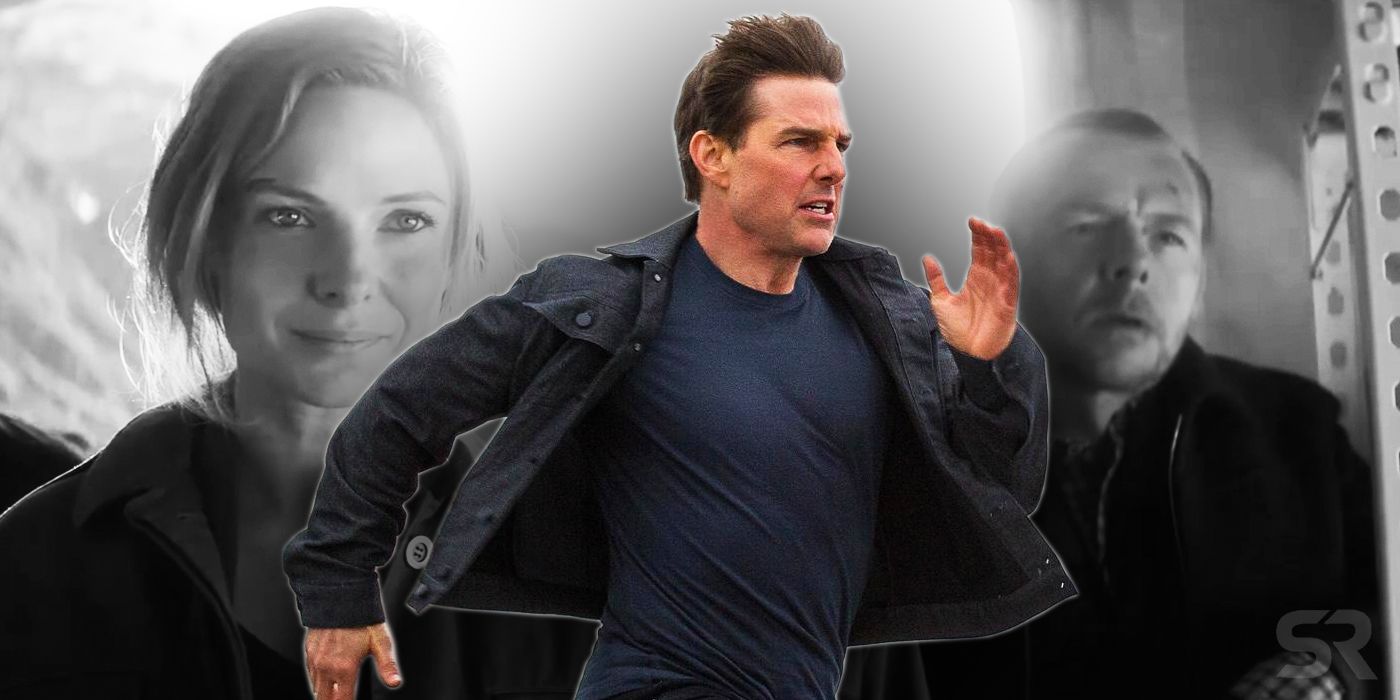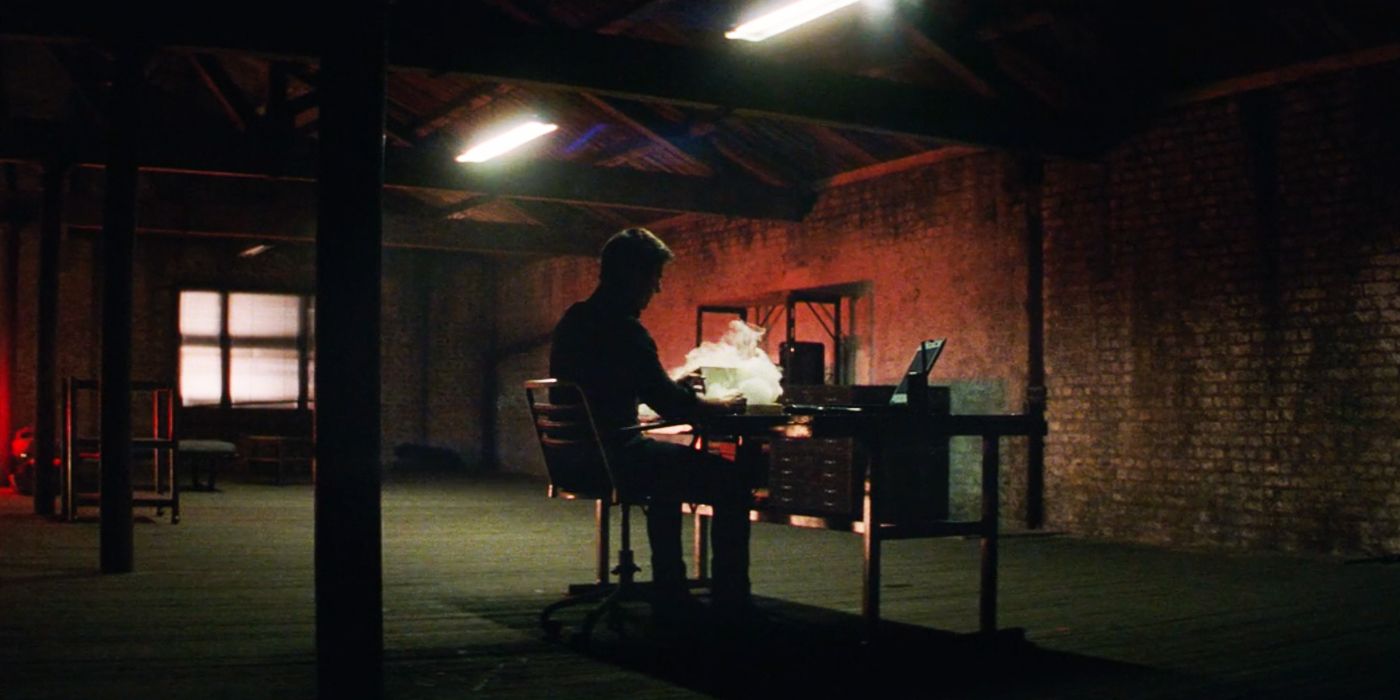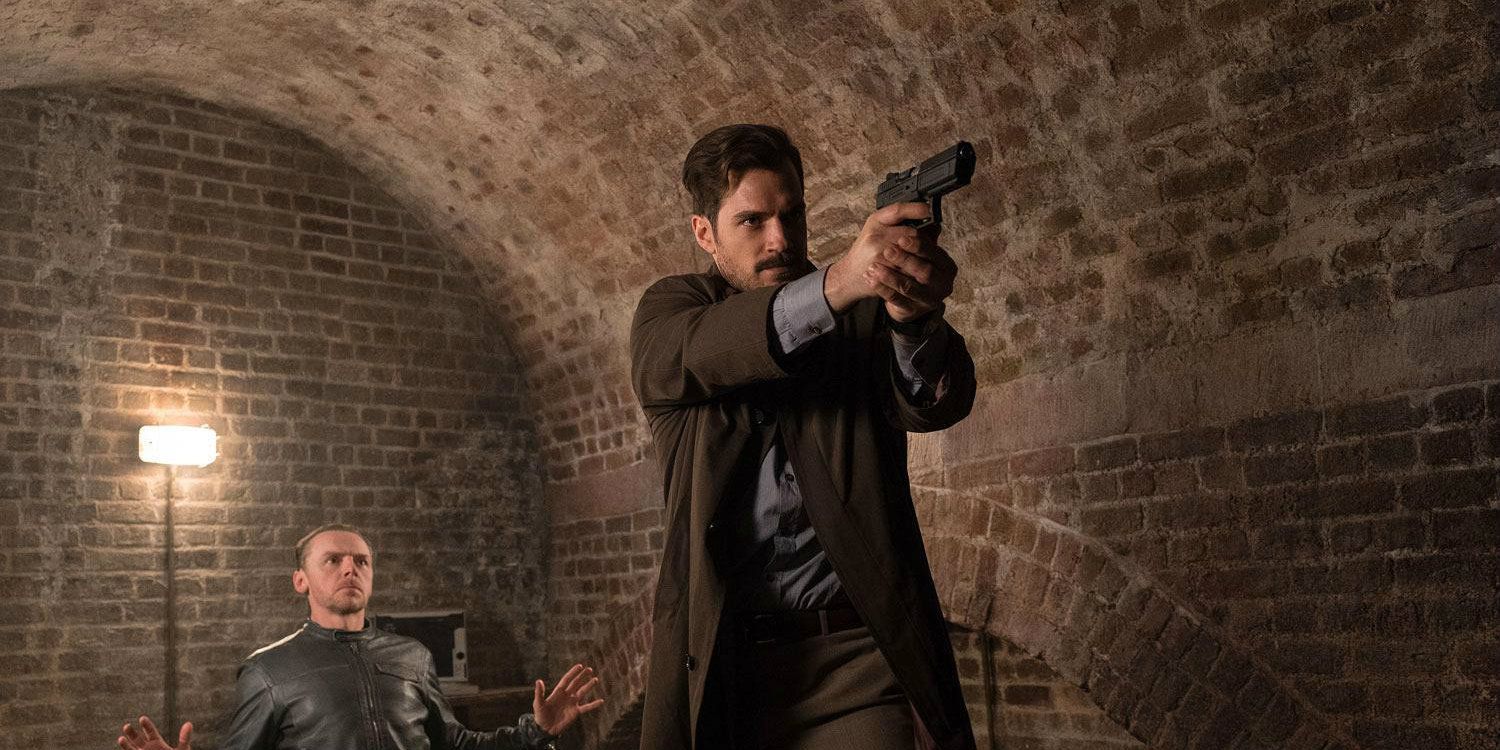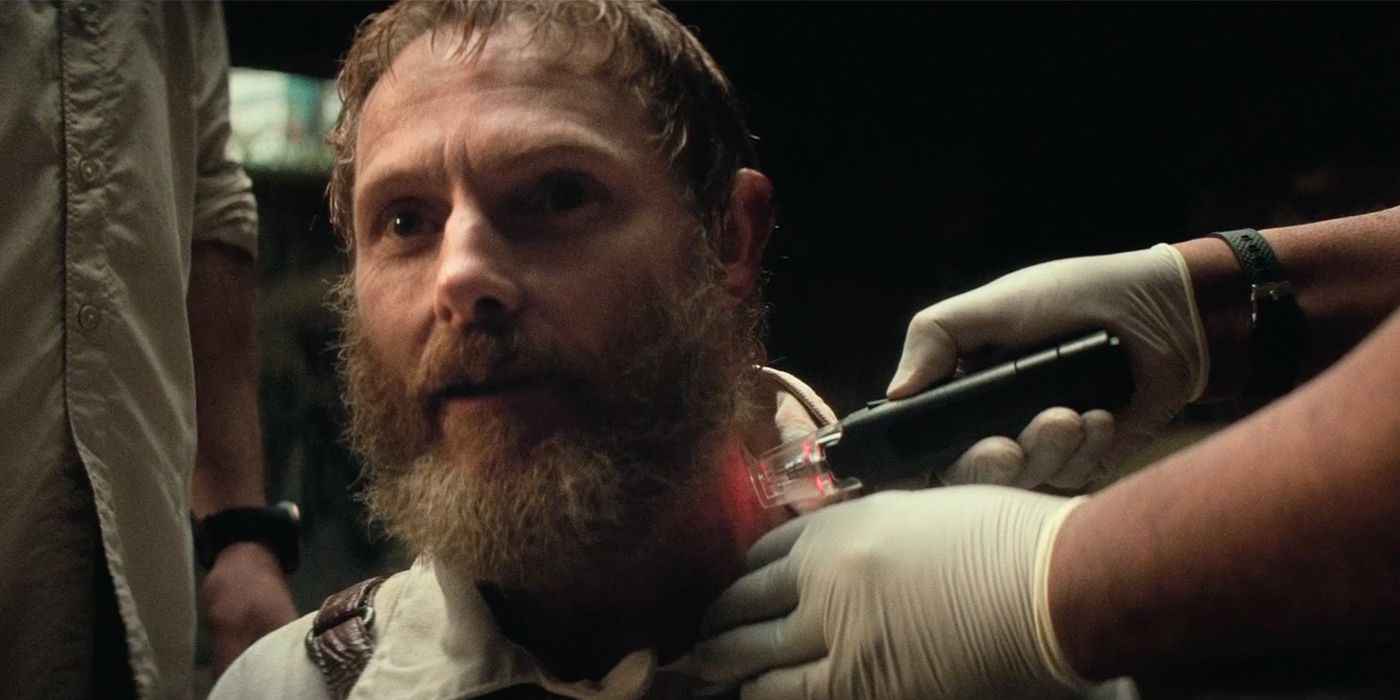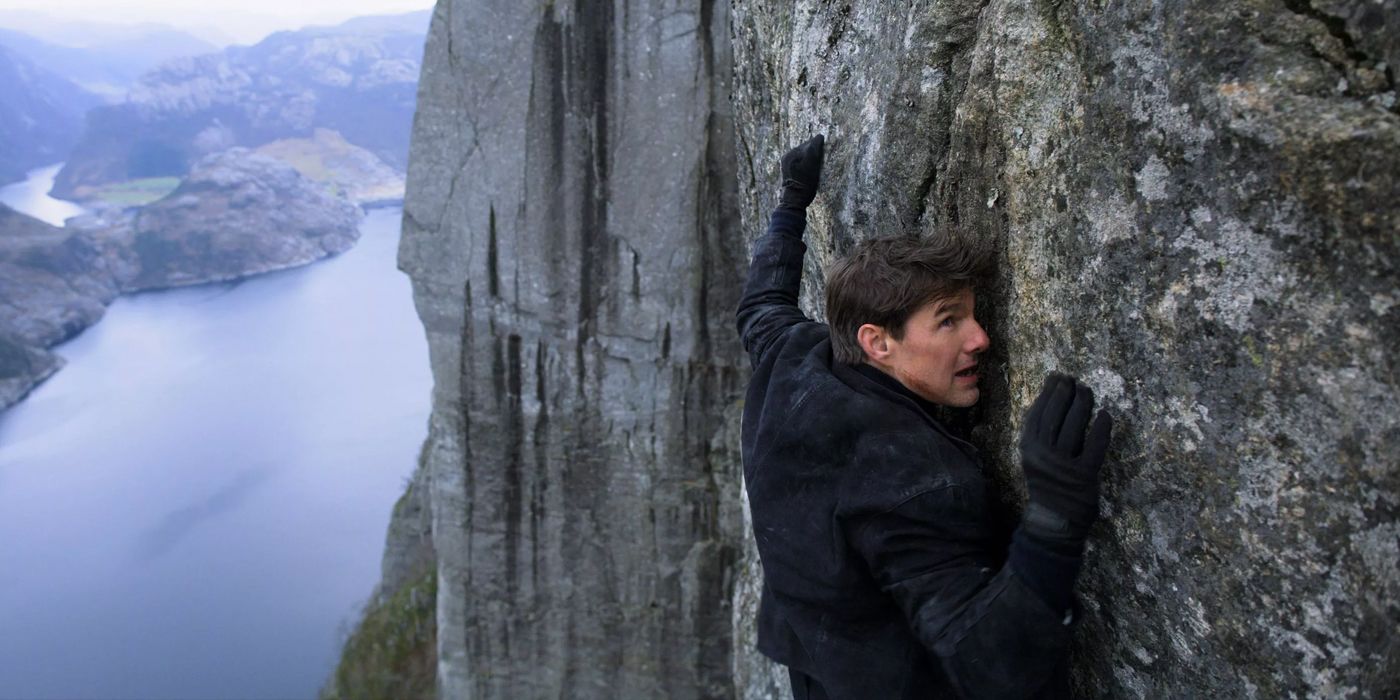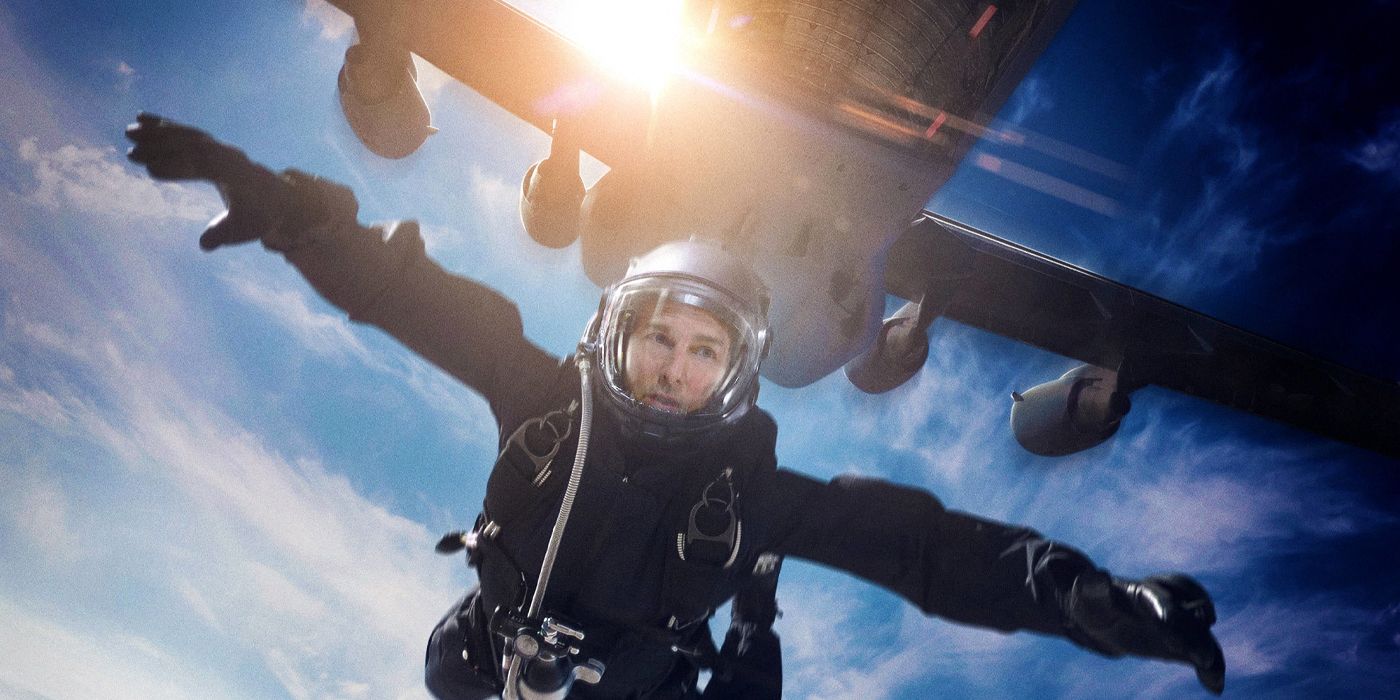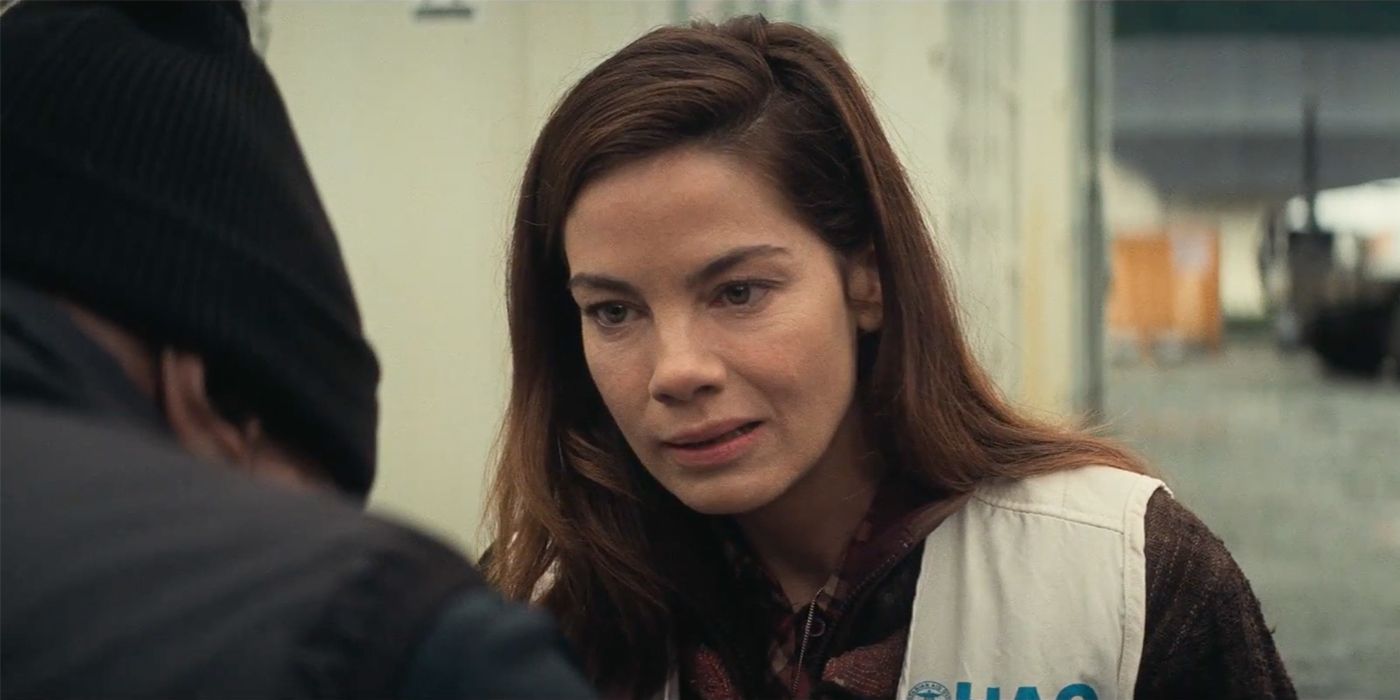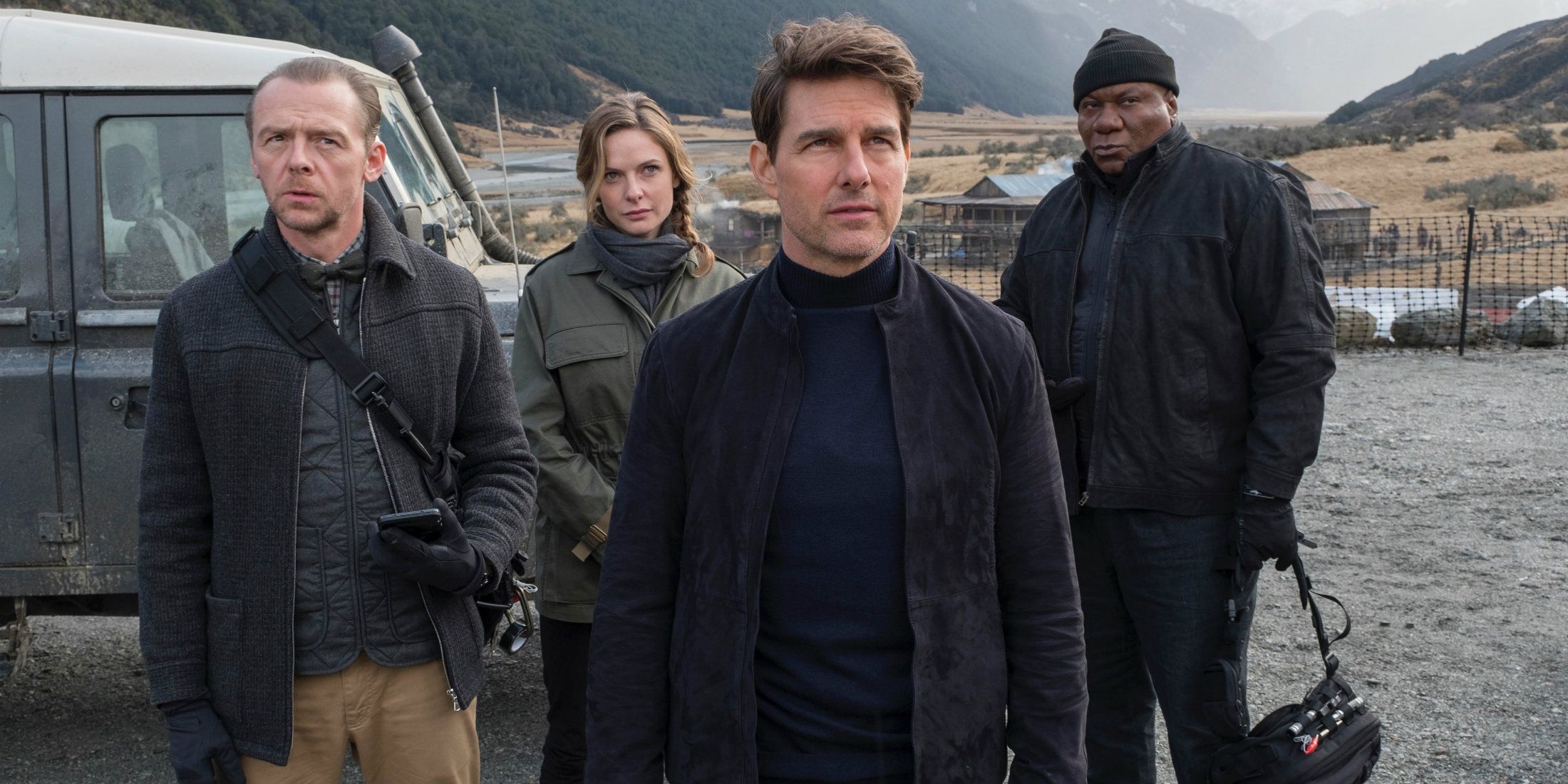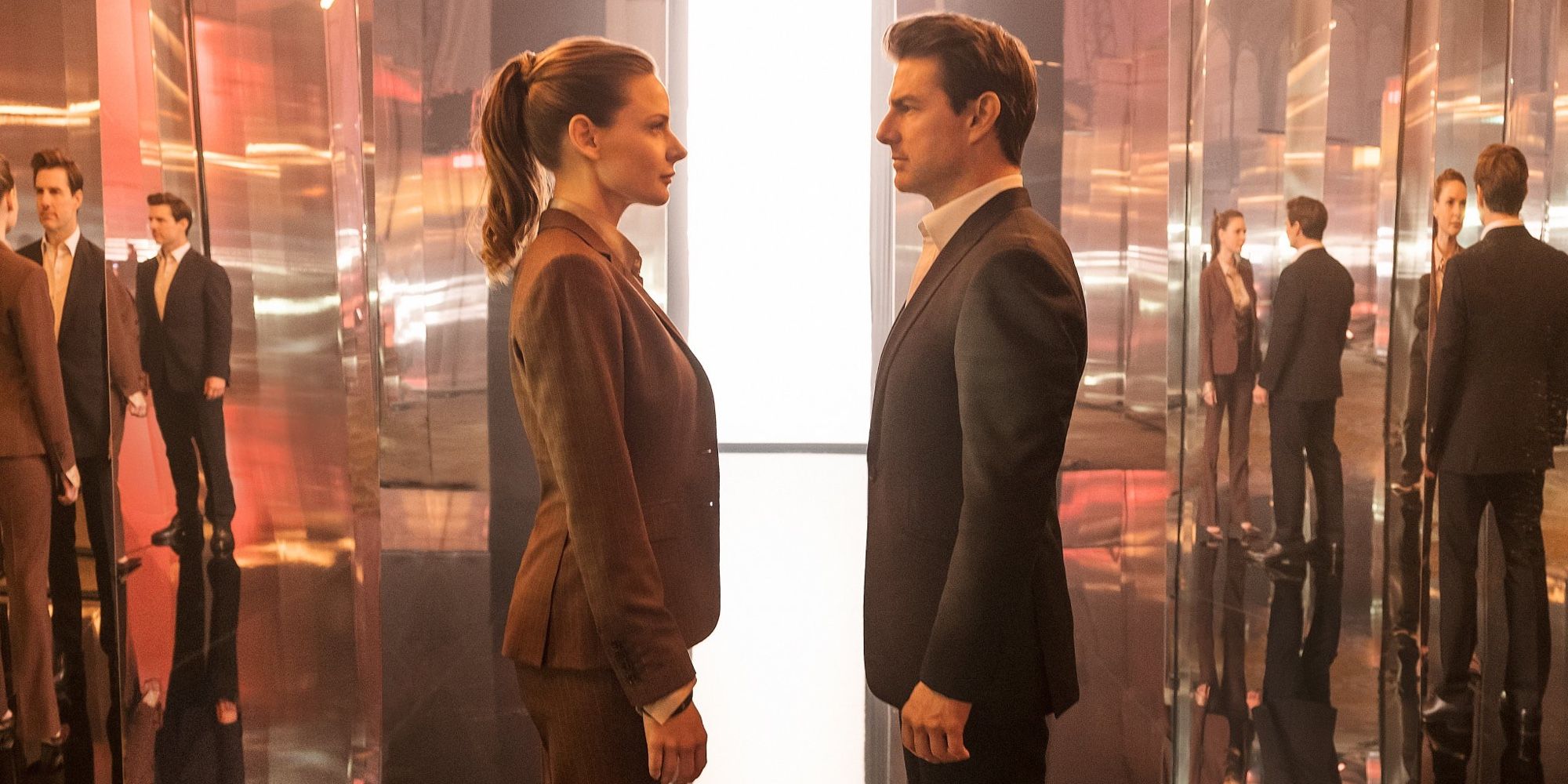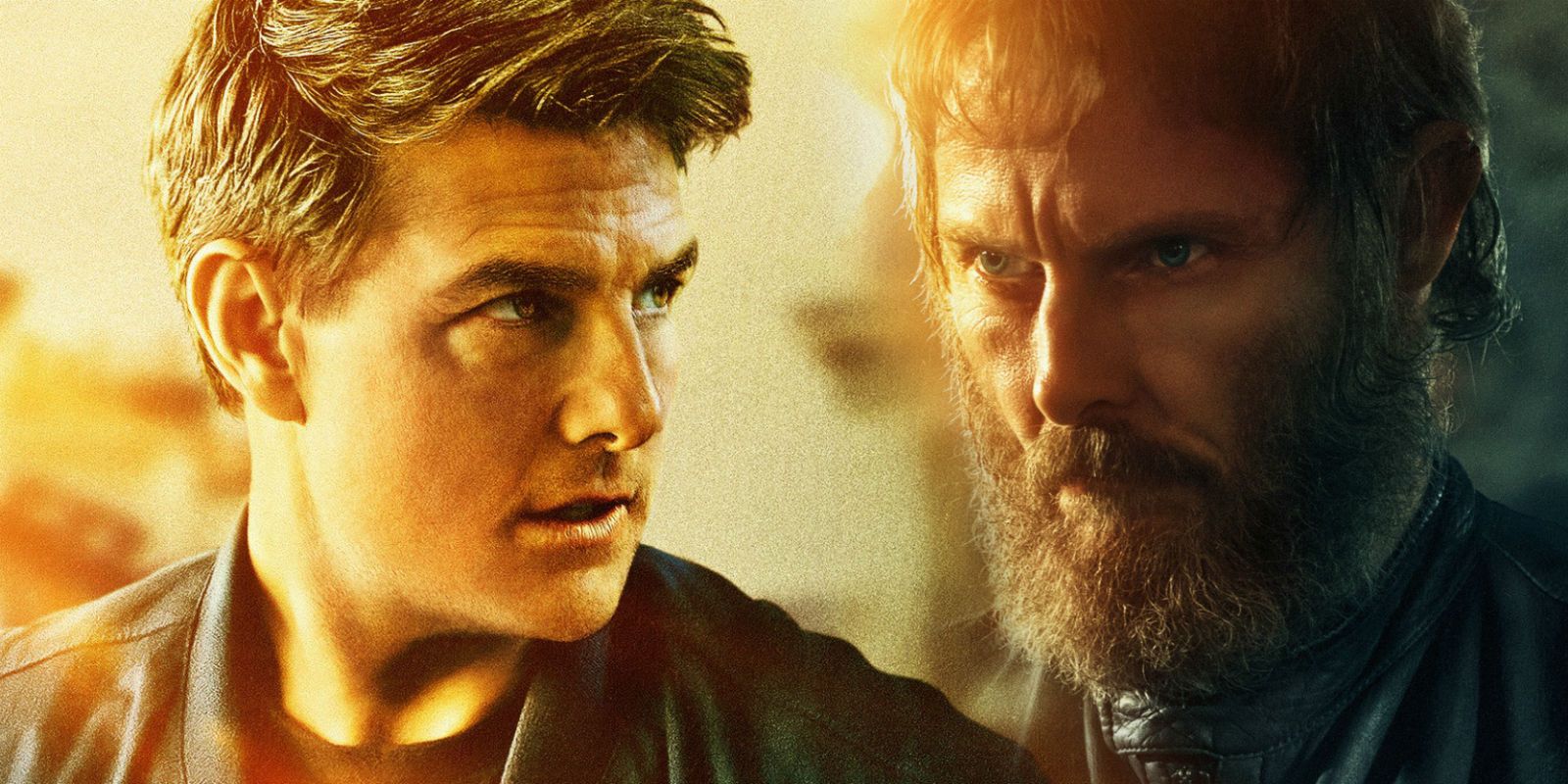WARNING: Spoilers for Mission: Impossible - Fallout.
Mission: Impossible - Fallout's ending may just be the best in the franchise's history. The whole film is a step up even from the already giddy heights Tom Cruise and co. are playing at, yet it's how the spectacular finale wraps up ideas running throughout the movie, its direct predecessor Mission: Impossible - Rogue Nation, and the whole franchise that's so impressive.
Mission: Impossible movies typically follow the same basic plot: Ethan Hunt is on a mission, things go south, he's suspected of having gone rogue, he goes rogue and fights to prove his innocence. Everything's usually rather convoluted along the way, but it's a formula that hasn't got tired in the past 22 years, with each new movie having a fresh take on the franchise.
Related: Mission: Impossible Movies Ranked - From The 1996 Original to Fallout
But none are quite as innovative as Mission: Impossible - Fallout. At 148 minutes, it sees Christopher McQuarrie playing on a much bigger canvas and, alongside the visceral in-camera action, he uses that time to explore just who Ethan Hunt is. Tom Cruise's constant world savior has long been an enigma, but now the real beating heart behind him has been explained.
- This Page: Mission: Impossible - Fallout's Plot Explained
- Page 2: Fallout's Opposite Villains (And What They Mean)
- Page 3: Mission: Impossible 6 Finally Explains Ethan Hunt
- Page 4: The Future of Mission: Impossible
The Very Complicated Plot of Mission: Impossible - Fallout Explained
Mission: Impossible movies always have deceptively complex plots, and Fallout may just take the nuclear cake. Much of its exposition comes in the pre-title sequence: after the capture of Solomon Lane (Sean Harris) at the end of Rogue Nation, the remnants of the Syndicate of anarchic rogue agents, known as the Apostles, are continuing his attempt at tearing the world down to start anew, with the mysterious John Lark dealing with them to claim three plutonium cores to enact their plan. Ethan Hunt loses these in a buy-gone-wrong (caused by compassion for his team), but manages to trick the scientist behind the bombs into giving up their technical readouts. All he has to do now is track them down.
Easier said than done. Intel suggests Lark plans to purchase the plutonium from the Apostles via broker White Widow (Vanessa Kirby), but when Ethan - now accompanied by CIA oversight August Walker (Henry Cavill), who says to boss Erica Sloan (Angela Bassett) he suspects Hunt is Lark and is using the entire mission as a cover - tries to observe he winds up having to pose as John himself. Inside the Widow's inner-circle, he learns that as payment for the cores he'll need to free Solomon Lane during his transportation between world powers in Paris. He manages to do this, although not without crossing paths with Ilsa Faust (Rebecca Ferguson), who has been tasked by MI6 to assassinate Lane, and takes the captive to London.
In London, the plan is presented to have Benji (Simon Pegg) dress up as Lane for the Apostles, with the real Solomon left behind to be overlooked by Walker. However, that's all a trap: when Hunt leaves (after defying Sloan, who shuts down the mission), Walker accidentally reveals himself as Lark to Benji in a Lane mask. Lark is working with the Apostles and, although nuclear annihilation is still the goal, framing Ethan was a key part of it. However, while Hunt at first thinks he's captured both Lark and Lane, the villains have backup and, following a foot-breaking chase through London, escape with two of the plutonium cores.
Related: Tom Cruise's Most Extreme Mission: Impossible Stunts (And How He Did Them)
This brings us to the finale. Lane's plan is to set the bombs off in Kashmir, polluting the water for an entire portion of the world he's already stricken with smallpox (he also has Ethan Hunt's estranged wife Julia moved there for extra personal victory points). Lane stays behind, happy to die in the destruction, while Lark leaves with the detonator. Benji, Luthor and Ilsa manage to get the bombs ready for disarmament and Hunt deactivates them after catching up to Walker.
Page 2: Fallout's Opposite Villains (And What They Mean)
What John Lark Wants
Mission: Impossible - Fallout has two villains working towards the same goal - to cleanse the world by putting it through hell - yet with opposite motivations. August Walker, the real John Lark, believes fully in the cause. He orchestrates Lane's release and the plutonium bombs, and in the grand scheme will be the one to lead the Apostles going forward. His goal is to achieve what the Syndicate wanted.
This is reflected in how he approaches the mission. He's introduced as the CIA hammer to Hunt's IMF knife, and while his loyalties don't lie there he is a man of brute force: a strong fighter, aggressively confident, and possessing a powerful backup. Like Lane he's also a schemer, able to repeatedly escape Ethan's grasp thanks to his advance plotting, although in arrogance repeatedly underestimates his opponents, getting discovered and repeatedly trailed when, ideally, he'd leave them behind completely; he repeatedly dismisses IMF as men in "Halloween masks" and bemoans Hunt for everything being "so f**king complicated".
What Solomon Lane Wants
Solomon Lane was already established in Mission: Impossible - Rogue Nation as a dark mirror to Ethan Hunt, committed to terror instead of safety. He was the agent gone bad, the one who willingly went rogue and took those more corruptible than Ethan. His goal in Rogue Nation was to destroy IMF and specifically its top agent. Even with his grand plan, Lane had an obsession with Hunt and desire to make him suffer; he knew he was the only one who could stop him.
Read More: Mission: Impossible - Fallout's Villain Plans & Twists Explained
In Mission: Impossible - Fallout, that returns. The Apostle plot and his attack on Ethan are intertwined, with him framing Hunt and causing a smallpox outbreak just so Walker can place Julia as a medical aid worker at the Kashmir village where the bombs will go off. Solomon Lane believes in the cause, but has personal grievances to address too. In the end, he doesn't even get a knowing death and is returned to the UK secret services.
How Ethan Hunts Wins
Lark and Lane represent two common villain archetypes: the planner and the attacker. One is obsessed with the scheme and has the hero intersect, while the other has the hero as an intrinsic part of their plot. More often than not, when the villain is intended to reflect the hero, we see these traits merged into one - see much of the MCU, Blofeld in Spectre, and Lane himself in Mission: Impossible - Rogue Nation - but Fallout delineates them into two characters, meaning the individual motivations can be greater explored and the imbalance highlighted.
After all, it's by playing on these differences that Ethan Hunt wins. Over the breakneck helicopter chase, Walker slowly loses his calm exterior to become an enraged brute attacking Hunt not because it will stop his plan (he doesn't pay much attention to the detonator at all) but out of pure emotion. His pretty boy exterior is warped by scalding engine fluid (and, finally, a giant hook) and his entire existence hinges on fighting Hunt. Conversely, Lane may have concocted the ultimate game for Ethan and spends much of the countdown toying with Benji and Ilsa, yet in the final moments becomes genuinely concerned with the plan's execution. Either villain becomes the other type when pushed against it, highlighting inherent character flaws.
That's what Mission: Impossible - Fallout's story presents, although what the movie's really focused on is reading the hero. To do that, we need to go deeper.
Page 3: Mission: Impossible 6 Finally Explains Ethan Hunt
Mission: Impossible 6 Finally Explains Ethan Hunt
Throughout the Mission: Impossible franchise, one consistent complaint has been the allegedly confused characterization of Ethan Hunt. Indeed, his personality changes as much as the tone or style brought about by a new director, with Mission: Impossible II's a straight action hero and Ghost Protocol's unthinking daredevil the same in name only. There is an arc to be gleaned if you dig deep (as Patrick Willems did in a recent video lecture), but that doesn't go all the way to underpinning the story. Mission: Impossible - Rogue Nation seemed to address this by abstracting Hunt. Everything about his death-defying antics became too extreme, with the character pushing himself to insane levels that his comrades simply couldn't fathom. When Alec Baldwin's Alan Hunley declared "Hunt is the living manifestation of destiny", it wasn't (totally) ironic: Ethan is something more than human.
Related: Mission: Impossible - Fallout Cast & Character Guide
Mission: Impossible - Fallout is really the counterpoint argument. In what is essentially the second part of his initial exploration, Christopher McQuarrie (the first returning director in the franchise's history) asks the converse question: what makes a normal person become Ethan Hunt?
The answer is not hidden. Early on, Hunley states quite clearly to Ethan that while he believes his compassion for his friends is his big weakness it's actually his greatest strength, and the rest of the movie is essentially an extended case study of this. Throughout we see Ethan risk his life, the task at hand or something otherwise personal to save others: he jumps after Walker into a lightning storm and transfers his oxygen mid-air; reconfigures the plan to spring Solomon Lane so no civilians are killed; pauses an escape to save an unfortunate police officer; pleads with Ilsa to step away. This is why the high-spectacle helicopter chase stands out amongst Mission: Impossible finales; once again it's about Ethan Hunt saving the world for assured destruction, yet this time we truly know why he's doing it.
Hunt is the compassionate rebuke of the notorious quote (often albeit spuriously attributed to Stalin), "The death of one man is a tragedy, the death of millions is a statistic." In events that threaten millions, he never loses sight of the individual. He pushes his body to breaking extremes because of an unwavering empathy for those around him. That does destroy a person inside and out - especially in the world of Mission: Impossible where the heft of fight scenes make clear every hit hurts and (in contrast to modern superhero cinema aided by the casting of Superman himself, Henry Cavill) means death is ever-present. But Mission: Impossible is also a just world, where Ethan's stretching is rewarded.
Both villains fail in the narrative because the heroes stop them just in time, but in a thematic sense it's because their negative desire to destroy civilization and/or Ethan can't match Hunt's overwhelming, positive will. Tellingly, this is a theme that sits at the front of McQuarrie's other work, most prominently, albeit in a darker form, with Keyer Soze in The Usual Suspects.
Julia Was The Key To Ethan... But Not Anymore
At the center of Ethan Hunt's emotional arc is Julia Meade. Introduced in Mission: Impossible III as Ethan's oblivious fiancée, Julia came to represent the normal life that he could never have; M:I-3 ended with the pair married, but Ghost Protocol twisted the marriage into a dark past, with Ethan putting Julia in hiding to protect her so he could go out and save the world. It was the ultimate sacrifice: he gave up his one to save the millions.
Related: How Much Did Mission: Impossible - Fallout Cost To Make?
She was completely absent from Rogue Nation but returns in Mission: Impossible - Fallout for the film's (nay, franchise's) most heartwrenching scene. A key part of Lane's way to destabilize Ethan is to have Julia (whose CIA protector was Walker) working in the basin where the two bombs will go off, a symbol of his inability to save her. This tragedy is compounded when she reveals herself just as the team are finding the first plutonium core, introducing husband Patrick; it's not so much that Julia has found someone else, it's that her connection to Ethan is still putting her in danger.
Julia was the physical representation of what Ethan Hunt could have been: a normal guy, married and blissfully happy. Fallout extends to makes the sacrifice a case of duty - it's a cautionary tale Luthor tells Ilsa - and so her presence is intended to weaken him. However, she instead proves to be essential to the questioning arc. In accepting everything that's happened, Ethan doesn't only save the day but manages to understand who he is.
Mission: Impossible Is A Team Once Again
Mission: Impossible - Fallout's exploration of Ethan Hunt's compassion goes both ways. He will always give himself to save others, but so too is he supported by a team of IMF agents with equally complicated motivations and personal drives. The construction of the finale is done so that each of the key secondary players - Ilsa, Luthor and Benji - have an essential role to the play right down to the line: fitting of Ethan's weakness-turned-strength, if any one doesn't come through exactly, the entire world is in danger. They even take the plunge at the last second not knowing whether Ethan has succeeded, a perfect show of expectation and trust. McQuarrie isn't just interested in showing that Ethan will do anything for his team, but to highlight the power of the group as well. That takes the themes already discussed wider, presenting them as something to be universally learned from.
In the framework of the Mission: Impossible franchise, this a major step. The 1960s TV show was an ensemble, something Brian De Palma's first film upended to shocking effect - original protagonist Jim Phelps betrayed IMF and only new character Ethan Hunt was left alive - and since it's very much been Tom Cruise's show. The team aspect has - mostly - been a key backdrop (that Rhames has returned for every movie is a delightful touch) but especially in the more recent efforts, the focus was singularly on Ethan's daring.
Related: Mission: Impossible Shouldn't Recast Tom Cruise
In the final scene, somewhat reminiscent of The Lord of the Rings' equally all-for-one-and-one-for-all recovery, this arc for Ethan is solidified. He lets Julia go and live free with Patrick, and embraces his team each on an individual level. Most importantly, for the first time, he shows how physically wounded he is.
Page 4: Mission: Impossible 7 - The Future of IMF & Apostles
IMF Is Back, Ready For Mission: Impossible 7
But, as has already been alluded to by Simon Pegg, Mission: Impossible - Fallout isn't the end of IMF. Indeed, with the recontextualizing of Ethan Hunt, the series has essentially created a blank slate for the future. Hunt is known and his biggest emotional hangups have been addressed, while the specific focus on the team makes clear that IMF - which is now without a leader after the death of Hunley - is set to be an ensemble effort. With this playing field, Mission: Impossible 7 can pretty much do what it likes.
This return to a status quo after a self-justifying adventure is very similar to what James Bond recently attempted with Skyfall and Spectre, although considerably stronger. There, while the first was an undoubted success, the second proved too confused over what it wanted 007 to be; it was Dark Knight seriousness mixed with throwback humor and a reflective plot just like Mission: Impossible - Fallout, but there was no cohesive throughline (best seen in its return to status quo moment instead seeing Bond run away). By this comparison, not only does Fallout provide a thoughtful look at what the franchise is while telling a new adventure, it reconfigures to give the future best freedom.
Read Now: Mission: Impossible is Now Better Than James Bond
The Apostles Are Still Out There
That said, there are still some key plot aspects out there that can - albeit needn't - be explored in a Mission: Impossible 7. The biggest, of course, is the Apostles, the remnants of the Syndicate. John Lark is dead and Solomon Lane is now under the watchful eye of the British, but the many other rogue agents are still out there lurking in the shadows. Note that their faces weren't shown, leaving ample opportunity for adventurous casting in the future.
We also have the White Widow (and her brother). Another British femme fatal, she's revealed to be allied with the CIA in the final moments, placing the character firmly in the morally ambiguous category. With a familial connection to Vanessa Redgrave's Max from the original Mission: Impossible, this is a new area very easy to return to.
-
Mission: Impossible has always shirked massive, overarching continuity, with Fallout the first time the story has continued from the previous entry, and even that was broad (another problem with Spectre in comparison - it took narrative threads instead of thematic ones). However, in establishing a clear grand antagonist and continuing to build the world, the series can gain some sense of purposeful structure as it enters its third decade, with at least some vague pre-plot justification for the 56-year-old Cruise continuing to accept the mission. And, now Ethan Hunt knows his greatest strength, less than nothing is stopping him.

